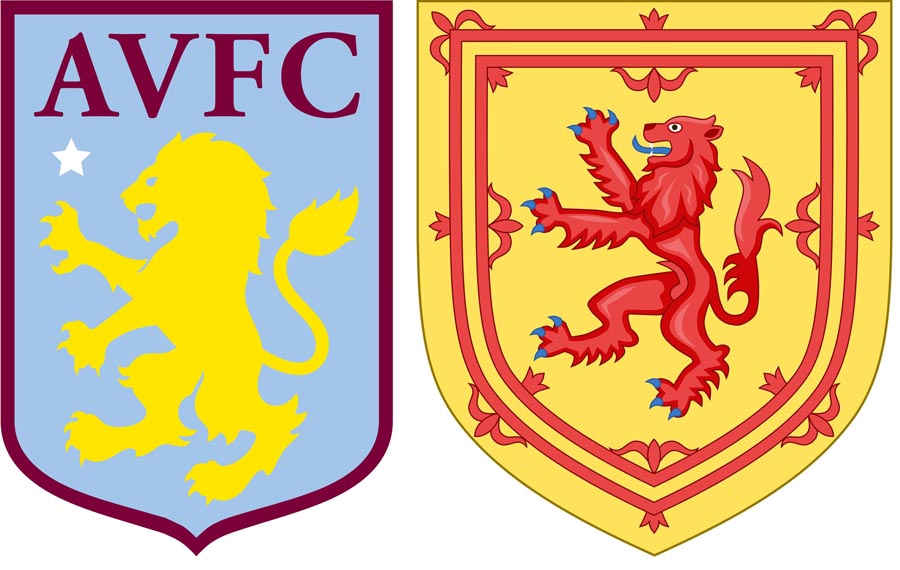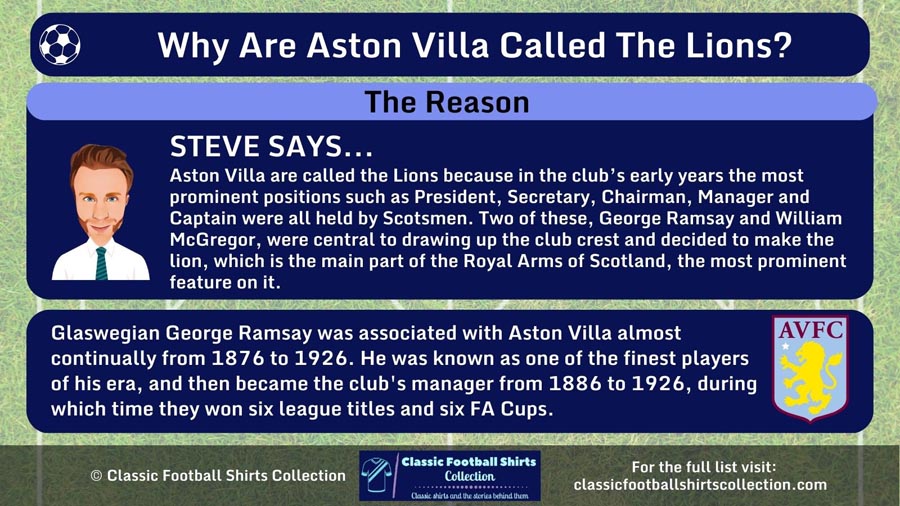
I learned something new last week.
All of my life I have known Aston Villa as the Villans.
Then I found out something that blew my mind.
They have another official nickname.
So why are Aston Villa also called the Lions?
Let’s find out…
Why Are Aston Villa Called The Lions?
Aston Villa are called the Lions because in the club’s early years the most prominent positions such as President, Secretary, Chairman, Manager and Captain were all held by Scotsmen. Two of these, George Ramsay and William McGregor, were central to drawing up the club crest and decided to make the lion, which is the main part of the Royal Arms of Scotland, the most prominent feature on it.

The Lion Rampant of Scotland

Before we go fully into the reasons why Aston Villa are called the Lions, we need to have a quick history lesson on the country of Scotland.
Did you know the Royal Arms of Scotland and the Royal Banner of Scotland have one thing in common?
Front and centre on both is a lion.
In fact, both are commonly known as the Lion Rampant of Scotland.
The earliest use of the Lion Rampant as the royal emblem of Scotland was by Alexander II in 1222.
It was officially incorporated in the Royal Arms and Royal Banners of Scotland in 1603, and has been part of them ever since.
So maybe you see where I am going here…
RELATED ===> Revealed: The Best Retro Aston Villa Shirts
A Strong Scottish Influence
Aston Villa is a club with a rich history, and one of the oldest in English football having been formed in 1874.
They were runners-up in the inaugural football league season in 1888/89 and had already claimed their first FA Cup by that time beating West Bromwich Albion in the 1887 Final 2-0.
The club’s really glory period came in a seven-season spell between 1893 and 1900 when they won the league five times and the FA Cup twice.
A lot of that early success was driven by a contingent of Scotsman, that truly stamped their mark on the history of Aston Villa.
The main (Scots)men were:
William McGregor: Chairman
Born in Perthshire in 1846, William McGregor moved from Scotland down to Birmingham to set up a drapery business in 1870. He immediately got involved with football and in 1877 he was invited to become a committee member of Aston Villa.
He then became club administrator, and in 1881 joined Villa’s board of directors. He is acknowledged as the founder of the Football League in 1888 and 1895 he became Aston Villa vice-chairman and two years later, he became the club’s chairman.
He was still involved in the game right up until his death in 1911 at the age of 65.
George Ramsay: Player and Manager
Ramsay was born in Glasgow in 1855, and was associated with Aston Villa almost continually from 1876 to 1926 as secretary, player and manager.
The story goes that Ramsay was walking past an Aston Villa training session in 1876 when he was called over to make up the numbers. Such was his skill that once the session was over the players asked him to join the club, and just a couple of months later he was captain!
In 1882 Ramsay retired from playing due to a knee injury, but in 1886 was appointed as the club’s first full-time paid manager. He was manager until 1926, during which time the club won six league titles and six FA Cups.
Archie Hunter: Player
When George Ramsay retired from playing Archie Hunter, born in Ayrshire in 1859, replaced him as Aston Villa’s captain.
He played for the club for 12 years and was idolized by fans, and became the first player to score in every round of the FA Cup in 1887.
In a game against Everton in 1890 he suffered a heart attack and collapsed. He never played football again and died four years later at the age of 35.
Fergus Johnstone: Vice President
Another Scot, Fergus Johnstone, was vice president during William McGregor’s period as president.
His son, Charles, played for Aston Villa in the same team as Hunter and Ramsay, and later became a club director and Aston Villa vice-president in the 1920s.
George Kynoch: President
George Kynoch was born in Peterhead in 1834 and served as Aston Villa President from 1887 to 1888. He was also a local businessman and MP.
As you can see, a large part of the club’s early years, its secretary, captain, chairman, president and vice-president were all Scottish.
And one way they made their presence felt was through the club crest.
RELATED ===> Why Are Bournemouth Called The Cherries?
A New Club Badge
At the time of the club’s formation, there was a strong Scottish presence in Birmingham, as is borne out by the fact the top men in Villa’s hierarchy at the time were all Scottish.
Proud of their own heritage, in 1878 McGregor and Ramsay in particular, were insistent that the club have a crest that recognised this.
Thus they decided to introduce the lion from the Royal Arms of Scotland.
As evidenced by John Lerwill’s Villa Chronicles book, it was used on the club’s notepaper and envelopes, and for a short time on the club’s shirts.
The lion was introduced back onto the club’s shirts in time for their 1957 FA Cup Final win and has remained on the kit in one way or another ever since.
The prominence of the lion on the club badge also lead to the alternative nickname, of the Lions.
Final Thoughts

Aston Villa’s rarely used nickname of the Lions, has its roots in the club’s strong Scottish ties during its formative years.
For the first few decades of Villa’s existence, Scotsmen held the most important posts at the club, notably Chairman, Secretary, President, Manager and Captain.
They decided that the club badge should reference the strong Scottish link so placed the lion from the Royal Arms of Scotland front and centre on it.
This led to Villa being nicknamed the Lions during the club’s early years.
It is still an official nickname for Aston Villa to this very day but is rarely heard, especially in comparison to its other nickname of the Villans.

Steve, the nickname of ‘Lions’ was only introduced in the last 50 years to my knowledge, though your reasoning is sound.
However, the ‘Villans’ nickname is one that everyone has known since around 1880, and was appropriated by Jack Urry, a well-known sports journalist who was one of the inner-circle of Villa friends.
Regards, John.
Thanks for the extra info John, much appreciated.